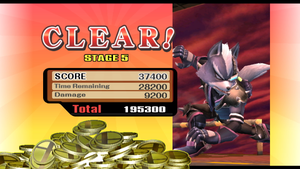Gold (collectible)
Gold (known as Coins in prior to Super Smash Bros. 4) is a type of currency used within Super Smash Bros. Melee, Super Smash Bros. Brawl, Super Smash Bros. 4, and Super Smash Bros. Ultimate for use in various features of the game. Initially having limited uses, later games in the series added several new gameplay modes where it can be used.
Super Smash Bros. Melee[edit]
Coins debuted in Melee, where they were rewarded after all versus matches and successful single player modes, with longer matches or better performances leading to more coins. The primary point of interest for Coins was for Melee's new trophy collecting aspect, where Coins could be used to potentially win new trophies in the game's Lottery mode. In addition, the game's Classic, Adventure, and All-Star modes all required varying quantities of Coins for the player to Continue. The player could own up to 999 coins at once.
There is a bug in Melee where, when playing as Zelda or Sheik, the amount of coins accumulated in a match is tracked independently between characters. This means that the coins earned by the transformation the player ends the match as will be the only ones added to the player's total coins.
Super Smash Bros. Brawl[edit]
Brawl expanded on the Coins' functionality by allowing them to have an effect on gameplay in the game's various online modes; selecting a stage in the mode would cost the player one coin, though selecting Random would not cost anything. Coins could also be used in the game's Spectator mode, with players potentially gambling coins for various awards. Outside of this, Coins reprise their role in the single-player games, though the Coin Launcher mini-game supplanted Melee's Lottery. As to make light of their increased number of uses, Coins could also be won in the game's Character Roll Call, and the number of coins the player could have at once was increased to 9,999.
Super Smash Bros. 4[edit]
Now known as Gold (usually abbreviated to "G" in-game), the currency returned in both versions of Smash 4, and its uses are again expanded. It is earned and spent in higher quantities than in previous games, with a cap of 999,999,999.
Gold is used to adjust the difficulty of Classic Mode, to buy play time in Trophy Rush, to play Special Orders, and to purchase trophies from the Trophy Shop. As an additional incentive to collect Gold, one of the Challenges in Super Smash Bros. for Wii U requires the player to amass 300,000 G. Outside of gambling in Spectator mode, Gold no longer has any use in online play.
Like trophies and custom parts, Gold is commonly obtained as a reward in various solo modes, and for completing certain challenges. Equipment can also be sold for Gold, and Gold is once again obtainable by simply playing versus matches, though not when playing With Anyone.
Trophy[edit]
The Gold trophy is exclusive to Super Smash Bros. for Nintendo 3DS.

- Gold (Classic)
You'll find these coins as you move through Classic mode. As you might guess, the most valuable of the three types are the gold ones. Your opponents gain strength as you progress, but stronger opponents also drop more gold. You can then use gold to up the intensity, giving you even stronger foes! It's a wonderful golden cycle!
You'll find these coins as you move through Classic mode. As you might guess, the most valuable of the three types are the gold ones. As you progress along the route, the opponents get stronger, and stronger opponents drop more gold. You can then use gold to up the intensity, giving you even stronger opponents! It all works out.
Super Smash Bros. Ultimate[edit]
Just like in Smash 4, Gold is obtained as a reward in solo modes and completing challenges. It can be spent to continue in Classic Mode and purchase items in the shop. Due to the overall importance of gold being reduced, the amount a player can have at once has been reduced to 9,999,999.
In Smash mode, Gold earned is approximately equal to the number of stick inputs (either left stick or right stick) made. For two inputs to count as separate, the stick must return to neutral in between, so for example dash-dancing will not yield any gold, but fox-trotting will. Both sticks must be neutral at the same time, so holding one stick and inputting with the other will not yield any gold. Jumping with the control stick (or even tapping it with tap jump disabled or tilting it) counts, but jumping with the X and Y buttons does not count. The control stick must move approximately 60% away from the center to count (note that it is possible to walk with less than this amount of movement). Attacks that do not involve a stick input, CPU inputs, and inputs made during Sudden Death all do not count. Matches that are quit also do not yield any gold, and neither do Challenger Approaching or Challenger's Approach matches (regardless of if the player wins or loses). In a match with multiple human players, there appears to be an increasing penalty where each player's inputs count less. In at least some single-player modes, the number of stick inputs appears to be used as a base when determining Gold earned.
It is sometimes possible to earn gold without it being ever displayed on-screen, such as when losing a Spirit battle in World of Light. The only way to see this gold is to check the player's balance afterwards.
An achievement in the Challenges section involves the player acquiring a total of 5,000 gold, with the reward being the Yakuman Player Spirit.
It is possible to obtain 100,000 or more gold from a single VS match, causing the display on the results page to go partially off-screen.

